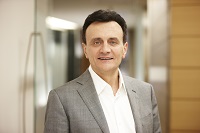 |
| AstraZeneca CEO Pascal Soriot |
AstraZeneca's ($AZN) executive team under CEO Pascal Soriot confidently batted down Pfizer's ($PFE) $120 billion takeover bid by putting an extraordinary valuation on its pipeline, often far exceeding the most optimistic forecasts by industry analysts. And now there appears to be a growing movement among a group of disenchanted investors at the U.K. company to hold management's incentive packages hostage to the sky-high expectations they've created.
Sky News is reporting that "a number of big AstraZeneca shareholders" are eager to sit down with former Barclays chief John Varley--the pharma giant's board member who chairs the company's compensation committee--to push a plan to link awards to management's $45 billion-plus revenue projection for 2023 as well as the £58.50-per-share threshold that the board set up as a fair value for the company.
Old Mutual Global Investors' Richard Buxton, a star among the U.K.'s fund managers, may have got the ball rolling on linking pay to rosy projections with a letter to the Financial Times, saying that if Pfizer's last spurned offer of £55 per share was inadequate, then perhaps managers' shares shouldn't vest until they hit that level. Investors, meanwhile, had already registered their opinion of the company's current pay plan, with a whopping 39% of the votes cast at the last annual meeting in April going against the remuneration report.
None of this, though, fits with Soriot's plan. Soriot has already rejected the idea of tying the company's compensation plan to the share price, telling the FT that share prices are also tied to the broader market, which can rise and fall without regard to an individual company's performance. But he's no less enthusiastic about the future. Within days of the failed Pfizer bid AstraZeneca execs had fanned out at ASCO in Chicago, confidently talking up the company's new position as a key player in developing promising new cancer drugs. One of those drugs, the immuno-oncology therapy MEDI4736, was assigned a $6.5 billion annual peak sales value. Another, AZD9291, was assigned a peak sales value of $3 billion, well over the $1 billion to $2 billion AstraZeneca says it has seen in analysts' estimates.
Pfizer's decision to float one last bid for AstraZeneca and then walk away after the rival board shunned the offer split the ranks of AstraZeneca's big investors into two groups. One group solidly backed the board's position, agreeing that Soriot and his crew had turned the corner on R&D after years of missteps and woefully bad bets. Others, though, were clearly miffed that the board never agreed to sit down and hammer out an agreement at a share price that would have rewarded many of them handsomely. And there's been considerable speculation that the discontented investors will continue to push for a new round of buyout talks.
The takeover talks are over for now, forced into hibernation by British M&A rules. But AstraZeneca could theoretically ask for a sit-down in less than three months while Pfizer can come back in 6 months.
AstraZeneca hasn't heard the last of its own projections. To wrestle free of Pfizer, AstraZeneca promised that the experimental drugs it is now working on can deliver a "risk-adjusted" payoff of $23 billion a year. On a non-risk-adjusted basis, the pharma company assesses its sales potential at a whopping $63 billion.
After spelling out the numbers behind its revenue forecast, no one is likely to forget anytime soon--especially as AstraZeneca's near-term future includes a continuing drop in revenue, until new drugs can come along to rescue the bottom line.
- here's the story from Sky News